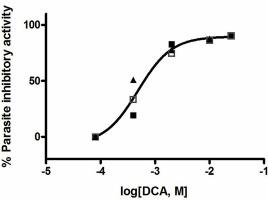International Journal for Parasitology: Drugs and Drug Resistance ( IF 4 ) Pub Date : 2020-07-22 , DOI: 10.1016/j.ijpddr.2020.07.002 Alba Martínez-Flórez 1 , Melina Galizzi 2 , Luis Izquierdo 3 , Juan M Bustamante 4 , Ana Rodriguez 5 , Fernando Rodriguez 6 , Alhelí Rodríguez-Cortés 1 , Jordi Alberola 1

|
Malaria, leishmaniasis and trypanosomiasis are arthropod-borne, parasitic diseases that constitute a major global health problem. They are generally found in developing countries, where lack of access to preventive tools and treatment hinders their management. Because these parasites share an increased demand on glucose consumption with most cancer cells, six compounds used in anti-tumoral research were selected to be tested as antiparasitic agents in in vitro models of Leishmania infantum, Trypanosoma brucei, T. cruzi, and Plasmodium falciparum: dichloroacetic acid (DCA), 3-bromopyruvic acid (3BP), 2-deoxy-D-glucose (2DG), lonidamine (LND), metformin (MET), and sirolimus (SIR). No parasite-killing activity was found in L. infantum promastigotes, whereas DCA and 3BP reduced the burden of intra-macrophagic amastigotes. For T. brucei all selected compounds, but 2DG, decreased parasite survival. DCA, 2DG, LND and MET showed parasite-killing activity in T. cruzi. Finally, anti-plasmodial activity was found for DCA, 2DG, LND, MET and SIR. These results reinforce the hypothesis that drugs with proven efficacy in the treatment of cancer by interfering with ATP production, proliferation, and survival cell strategies might be useful in treating threatening parasitic diseases and provide new opportunities for their repurposing.


























 京公网安备 11010802027423号
京公网安备 11010802027423号